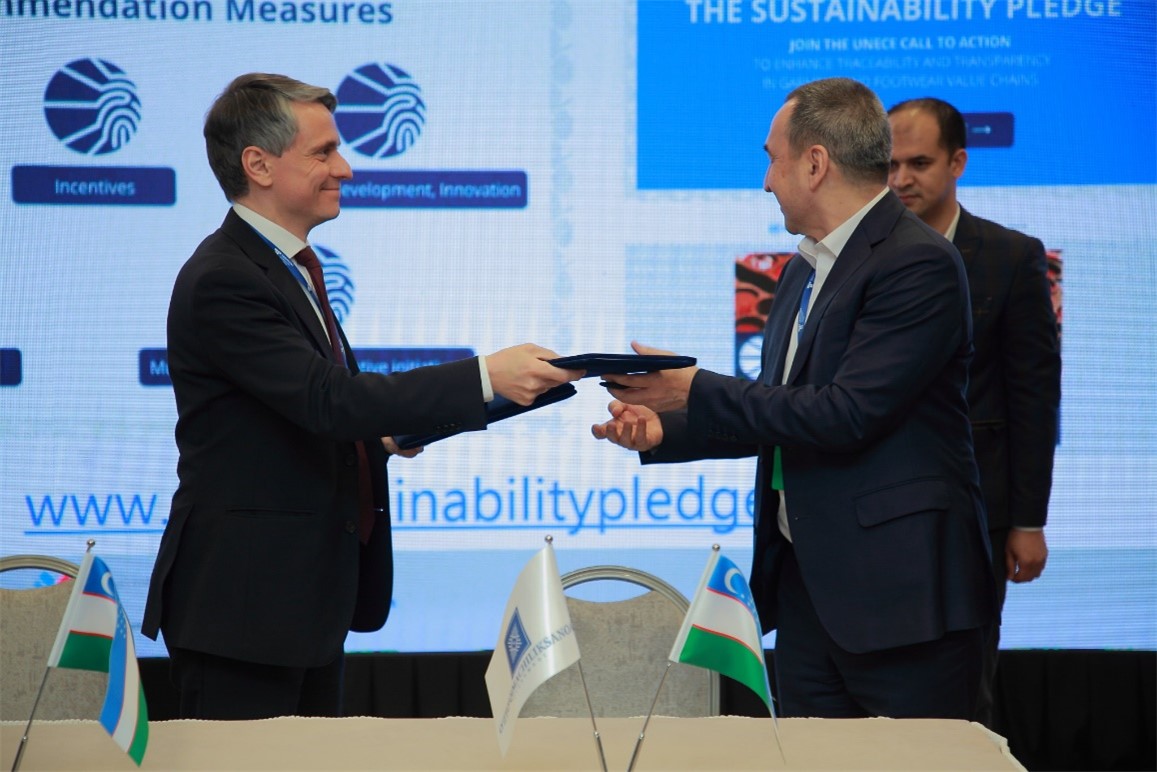
Supporting UNECE programme countries in achieving the Sustainable Development Goals (SDGs) and strengthening the support for micro-, small-, and medium-sized enterprises (MSMEs) have been central, cross-cutting themes in UNECE agendas in response to the triple planetary crisis and the Covid-19 pandemic. In 2022, the deteriorating global economic outlook and rising inflation have encouraged many economies to diversify their trade relationships, increase the value of their exports, and become more resilient. In this context, speeding up accession to the World Trade Organization (WTO) has become a priority for several Central Asian countries that are not yet part of the multilateral trading system. This includes Uzbekistan, the landlocked developing country at the heart of the ancient Silk Road.
Uzbekistan is a major producer and exporter of cotton – in 2022 it was the eighth largest cotton producer in the world.19 The cotton sector is an important source of employment and opportunities for MSMEs.
19
Statista (2022). Leading cotton producing countries worldwide
However, for several years, the export of Uzbek cotton and textiles was held back due to concerns about social and environmental issues, such as the use of child and forced labour. This led to a boycott of Uzbek cotton, initiated by a coalition of international textile businesses and organizations. Following International Labour Organization reports noting significant progress on the country’s labour and human rights, on 10 March 2022 the Cotton Campaign boycott was lifted.20
This development holds great potential for enhancing market
access to Uzbek cotton and textile producers. In this regard, UNECE worked closely with the private sector in Uzbekistan and supported the implementation of a blockchain pilot for the traceability of textiles in Uzbekistan through its “Sustainability Pledge” initiative based on UN/CEFACT standards and recommendations. Conformity with the Better Cotton Initiative means that Uzbek cotton is produced in accordance with global sustainability standards.21
21
The Better Cotton Initiative is a non-profit, multistakeholder governance group that promotes better standards in cotton
farming and practices in 24 countries
Number of operation enterprises in Uzbekistan, 2016–2021
Despite the COVID-19 pandemic, entrepreneurship in Uzbekistan is booming
Since 2016, comprehensive reforms have been adopted to promote entrepreneurship and increase the value added of exports, with the goal to move away from raw materials towards higher value-added textiles. Export diversification could contribute to the achievement of SDG targets 9.2 and 9.3.22
22 SDG target 9.2: Promote inclusive and sustainable industrialization and, by 2030, significantly raise industry’s share of employment and gross domestic product, in line with national circumstances, and double its share in least developed countries; SDG target 9.3: Increase the access of small-scale industrial and other enterprises, in particular in developing countries, to financial services, including affordable credit, and their integration into value chains and markets.
Another chapter of the UNECE’s agenda on MSMEs concerns innovation policies. In recent years, Uzbekistan has shown strong political commitment to spurring innovation-led growth of its economy, not least by establishing the Ministry of Innovation in 2017 and formulating national innovation strategies. In support of the country’s strategic innovation policy ambitions and regional efforts as reflected in the SPECA Innovation Strategy for Sustainable Development, UNECE recently undertook the country’s first Innovation for Sustainable Development Review of Uzbekistan (2022). The study examined the national innovation policy governance, processes, and instruments in the country, providing concrete recommendations on how existing mechanisms can be improved to have a catalytic impact on innovative activity. Results and recommendations of the analysis fed into the country’s new National Innovation Strategy 2022-2030, which is now being implemented by the newly established Agency for Innovative Development under the Ministry of Education, Science and Innovation. As a result of the continuous work and improvement of the national innovation
system, in 2022 the WIPO Global Innovation Index ranked Uzbekistan in 82nd place, improving by ten positions over the last two years (Table 2), making it Central Asia’s highest ranked country.23
23 WIPO (2022), Global Innovation Index 2022 – Uzbekistan.
Climbing up the ladder: Global Innovation Index rankings for Uzbekistan (2020-2022)
Looking ahead, accelerating the WTO accession process will be essential to increase the country’s competitiveness, which will also bring spillover benefits to Uzbekistan’s growing MSMEs. In addition, traceability and transparency will remain critical requirements to demonstrate compliance with the environmental, social, and governance considerations, which have become increasingly important to global businesses and consumers along value chains. UNECE is ready to support the smooth integration of Uzbekistan and its MSMEs into the multilateral trading system.